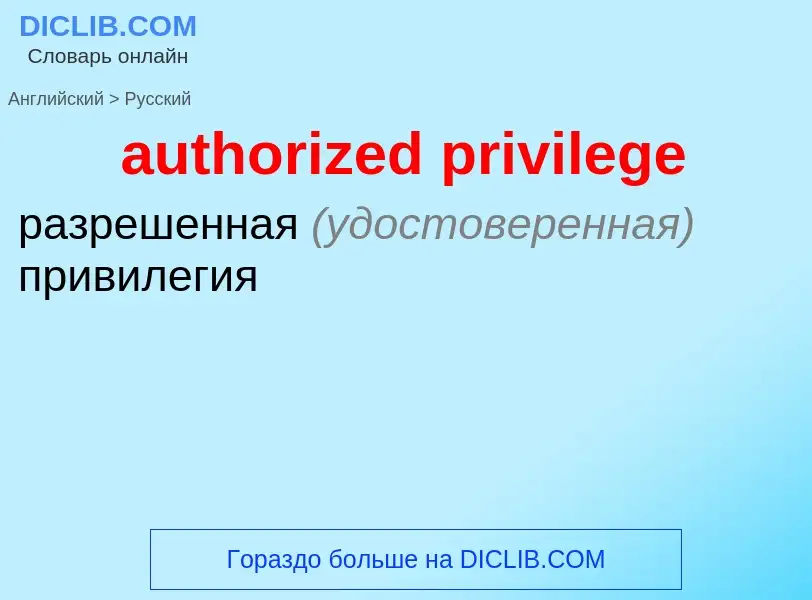Übersetzung und Analyse von Wörtern durch künstliche Intelligenz ChatGPT
Auf dieser Seite erhalten Sie eine detaillierte Analyse eines Wortes oder einer Phrase mithilfe der besten heute verfügbaren Technologie der künstlichen Intelligenz:
- wie das Wort verwendet wird
- Häufigkeit der Nutzung
- es wird häufiger in mündlicher oder schriftlicher Rede verwendet
- Wortübersetzungsoptionen
- Anwendungsbeispiele (mehrere Phrasen mit Übersetzung)
- Etymologie
authorized privilege - Übersetzung nach russisch
финансы
разрешенный к выпуску (акционерный) капитал (акционерный капитал, зафиксированный в уставе компании, т. е. максимальное число акций, которое может быть выпущено в соответствии с уставом компании; фактически выпущенный акционерный капитал может быть меньше)
экономика
уставный капитал
синоним
Смотрите также
Definition
Wikipedia
Executive privilege is the right of the president of the United States and other members of the executive branch to maintain confidential communications under certain circumstances within the executive branch and to resist some subpoenas and other oversight by the legislative and judicial branches of government in pursuit of particular information or personnel relating to those confidential communications. The right comes into effect when revealing the information would impair governmental functions. Neither executive privilege nor the oversight power of Congress is explicitly mentioned in the United States Constitution. However, the Supreme Court of the United States has ruled that executive privilege and congressional oversight each are a consequence of the doctrine of the separation of powers, derived from the supremacy of each branch in its area of constitutional activity.
The Supreme Court confirmed the legitimacy of this doctrine in United States v. Nixon in the context of a subpoena emanating from the judiciary instead of emanating from Congress. The Court held that there is a qualified privilege, which once invoked, creates a presumption of privilege, and the party seeking the documents must then make a "sufficient showing" that the "presidential material" is "essential to the justice of the case". Chief Justice Warren Burger further stated that executive privilege would most effectively apply when the oversight of the executive would impair that branch's national security concerns. Regarding requests from Congress (instead of from the courts) for executive branch information, as of a 2014 study by the Congressional Research Service, only two federal court cases had addressed the merits of executive privilege in such a context, and neither of those cases reached the Supreme Court.
In addition to which branch of government is requesting the information, another characteristic of executive privilege is whether it involves a "presidential communications privilege" or instead a "deliberative process privilege" or some other type of privilege. The deliberative process privilege is often considered to be rooted in common law. In contrast, the presidential communications privilege is often considered rooted in the separation of powers, thus making the deliberative process privilege less difficult to overcome. Generally speaking, presidents, congresses and courts have historically tended to sidestep open confrontations through compromise and mutual deference because of previous practice and precedents regarding the exercise of executive privilege.

